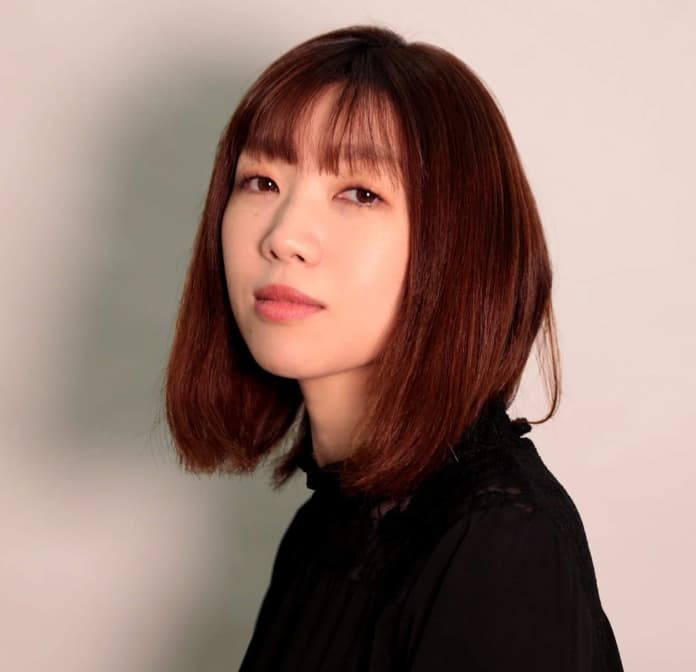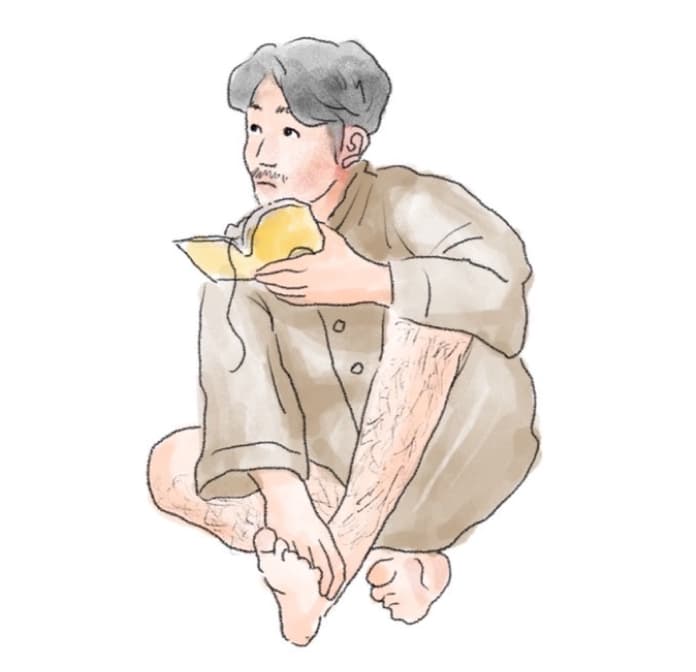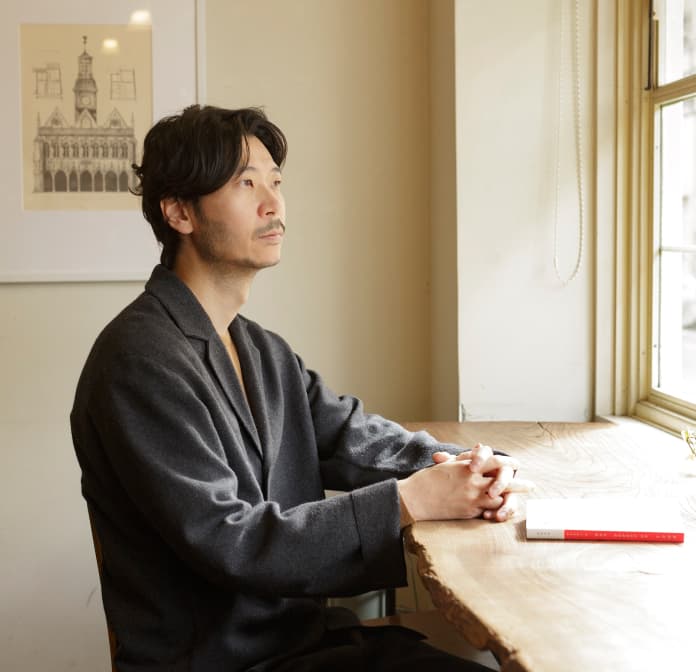I bought a house without talking to anyone about it.
It was an old place I found through a vacant house database. I always thought buying a house was something you did more carefully—for example, after discussing it with your partner or family—but in my case, on my own, it was incredibly simple: I made an inquiry online, went to see the place, and signed a contract on the spot. It was my tenth year as a working adult, and the money I’d saved up little by little was enough to cover it. That and the fact that I could get away with just some light renovations on the sturdy, plainly built home were the deciding factors.
A truck’s worth of my things was on its way from Tokyo to Fukuoka. It made me laugh somehow that my fourteen years of life in Tokyo had been packed up in an hour or two and were on that truck.
“Just like that.”
I boarded a plane and flew from Honshu to Kyushu. During the two days it would take for my luggage to arrive, the plan was to stay at a hotel in Hakata. Only in Fukuoka is the city so accessible from the airport. I took a taxi from the airport to my hotel. I had with me a small suitcase and a few plum branches.
Out the car’s window, the streets of Hakata. The Naka River from Nakasukake Bridge. The orange evening sky reflecting on the water.
“Hakata’s also a river town, you know.”
Words my father had said to me when I was very young suddenly came to mind. I think we had been looking at the colorful neon signs reflecting off the Naka River back then, too.
That day I turned in early at the hotel, and after breakfast the next morning, I headed to Ohori Park for the first time. I was surprised to find such abundant green and this large body of water so close to downtown. The pond was originally the moat of Fukuoka Castle, and it takes about an hour to walk around it at a leisurely pace. A scattering of islands slice through the pond, and you can walk across via the bridges that connect them. Matsushima, in the center, is like a little floating forest. Various varieties of fish swim in the park’s clear stream, and now and then runners pass by.
Thinking to have some lunch, I took a seat on the second floor of the cafe facing the water and ordered a set I’d never seen before: Yamecha and Nibosaba Chazuke. “Nibosaba” is apparently mackerel that was raised on niboshi or raw anchovies; soaked in bitter daidai orange and sesame sauce, the umami is as intense as you’d expect. Pouring the yamecha with its mellow sweetness over the dish, I ate the light rice soup that resulted. When I added the Ariake seaweed and horseradish, their fragrances blossomed, keeping each bite interesting all the way to the end. As I enjoyed these very Kyushu flavors, it hit me:
I’ve left Tokyo.
Out the cafe’s large window was clear, open sky, and big birds like herons were standing by the water’s edge.
Tomorrow’s the day I’m moving into my new house.
The next morning, my real estate agent drove over to pick me up at my hotel.
From Hakata, it was about a 30-minute ride. Buildings gradually vanished from the landscape out the car window, turning into trees and other countryside green. The mountains that had been in the distance gradually showed themselves more clearly, and it felt like if I reached out I would be able to touch them.
“You can tell the air’s different around here. We’ll be at your place in about five minutes,” he said to me as I rolled the window all the way down in the back seat. This suburban land surrounded by nature seemed to have remained unchanged since long ago.
When we arrived and the agent cut the car’s engine, there was birdsong in the silence.
The house I bought was an old house about ten minutes from where I lived as a small child with my parents.
***
I was born in this town. Before that, my mom and dad lived in Kyoto, but then Dad was transferred to Fukuoka for work.
I lived here till about age five, so my memories are quite fragmented, but there are some crumbs that stay with me. My parents straddling a stepladder and picking plums every year. The fine fuzz on the plums lined up on the engawa porch. The mountain out back where I fell and skinned my hands and knees any number of times. How blue the sea was when they took me swimming at Itoshima.
Mom seemed to enjoy living in Fukuoka, but Dad’s feelings were apparently more complicated. Once Mom told me that Dad was a scholarly sort of engineer and never really wanted to be promoted, but as it happened, his work was highly valued and he ended up in a managerial position. Honest to a fault, he wasn’t great with people. He got caught up in interpersonal friction and factional arguments and ended up transferred into a department he wasn’t really keen on, which is why he was sent to Fukuoka.
After a number of scandals and incidents at the company’s headquarters, the family moved back to Kyoto five years later, and after that Dad threw himself into his work, not even taking the weekends off. Since he was almost never home, I had hardly any memories of talking to him. To Sports Day, Parent Observation Day, and all the recitals for my activities, it was always my mom who came, alone.
“Next weekend is her last piano recital as an elementary schooler. You really can’t come?”
“I told you, I have work.”
“But she’s prepping so hard. Couldn’t you at least come for part of it?”
“It doesn’t matter whether I go or not; it’s about the fruits of her daily practice.”
As it was, I quit piano when I started junior high.
We lived in a residential suburb of Kyoto City in a typical turnkey house. It was a totally unremarkable home, but my mom always kept the yard looking nice. She had brought plum branches from Fukuoka and was carefully growing the cuttings at our house in Kyoto. Dainty plum flowers bloom just a little earlier than cherry blossoms. When I entered middle school, the trees started to fruit, and each year Mom would carefully clean the plums and make them into syrup and wine. Jars lined a shelf in the kitchen. Each had a slightly different tint of amber, and I always looked forward to the new jar being added.
“Okay, this one’s all set. Let’s have a taste in six months.”
For now, the jar was still clear. But over the next year or two, the color would change, and the flavor would mellow and deepen.
“I can’t wait to drink plum wine with you.”
“Let’s have a toast on your 20th birthday, all three of us. I’ll make sure to have a tasty jar ready.”
In the twilight, Mom and I rolled rock sugar on our tongues as we stuck a label on the jar and put it on the shelf.
***
Mom sat up in bed and said, “Living in Fukuoka was so great. Your dad wasn’t as busy, so the three of us could spend lots of time together.” It was rare for her to talk about the past.
“Yeah, Fukuoka was nice. I remember it a little, too.”
“Do you remember the morning view of the mountain and the walks we would take? And we used to have a drink at night listening to bugs chirping. The blue of the sea when we went on a day your dad wasn’t working and you smiling in your straw hat. Every joy I wished for in life, we had. I wish we could have gone back.”
“We should go, all three of us.”
“Hmm, I wonder if your father would like that.”
The year I graduated high school, my mom died. She had been sick for a long time and told me how she felt about Fukuoka a few months before she passed away.
Until then, I never knew how important those days were to her. She had never mentioned them before. I remembered her tenderly caring for the plums, lining them up on sheets of newspaper on the engawa as if inspecting them one by one.
When I got home after the funeral, I looked at the plum trees. They seemed lonely, as if they were waiting for my mom to return.
After Mom died, it felt even more like there was some kind of invisible wall between me and my dad. Dad was always a career man, so we had never really sat down for a heart-to-heart talk, and since he worked even on the weekends, it didn’t feel like there was an opportunity to take that sort of time.
I moved away from Kyoto on the occasion of starting college, and after graduating, I went to work at a big IT company in Tokyo. It wasn’t the sort of work I could confidently claim that I loved, but even so, it’s been ten years. There were busy periods, but I didn’t have any major issues with the job, and I enjoyed my life in Tokyo pretty well. None of them lasted very long, but I had a few romances, too.
Right as I hit my tenth year, society changed dramatically, and the whole company went remote. I felt a lot better emotionally not having to go in to the office, but being holed up at home all the time was kind of depressing. My room was a 12-mat studio on the top floor of a three-story low-rise. It was a fairly new building and close to the station. I liked it quite a bit, what with the easy commute. But once I started working remotely, I felt a distinct lack of variation with only a few steps between where I worked and where I slept, and it was pretty hard to switch gears. Chatting with a girl who joined the company at the same time as me after online meetings helped keep my spirits up.
“What do you do on your off time?” I asked her.
“Actually, I started taking online pilates lessons last week. If you’re feeling out of shape, it really works!”
“Wow! I should do something too...”
“Other than that, just patrolling real estate websites looking for somewhere to move to.”
“Oh, me too. It’s so easy to waste a whole day browsing online listings.”
“Even though we already stare at our computers for work! But there’s no reason for us to pay high rent to live near the office anymore...”
A few of our coworkers had already moved to Kamakura or Zushi along the coast, or built a house in a mountain valley in Nagano, and seemed to be enjoying life closer to nature. It was my tenth year at the company, too, so I had a decent amount of savings, and lately the urge to try living somewhere that wasn’t here had sprung up.
I grabbed a pen and paper to write up a list of candidate cities. But then I recalled my mom’s wish before she died to return to Fukuoka, along with my hazy childhood memories, so I did write anything past the second entry.
I used vacant house databases and so on to start looking for places in the suburban neighborhood outside of Fukuoka city where I had once lived. At first I was at a bit of a loss because there were fewer rental properties than I expected, but occasionally I came across used houses at prices within my reach, so I made up my mind to consider properties for sale as well. By chance, I happened to find a house near the one my family used to live in; I got in touch right away and made an appointment to go see it that weekend.
“This property actually just went on the market. It’s a real find. Doesn’t need much fixing up for the price. And we can introduce you to a good construction company.” The real estate agent was a man just a little younger than me who said he was from the area. “Recently there have been more young people moving into the region.”
The mudroom’s floor was cracked, and the surfaces of the walls and the plumbing needed some improvement, but the view through the open windows made me somehow nostalgic; something in the soft sunlight aligned vaguely with a distant memory.
“I like this place.”
Everything proceeded so rapidly from there, even I was surprised.
***





